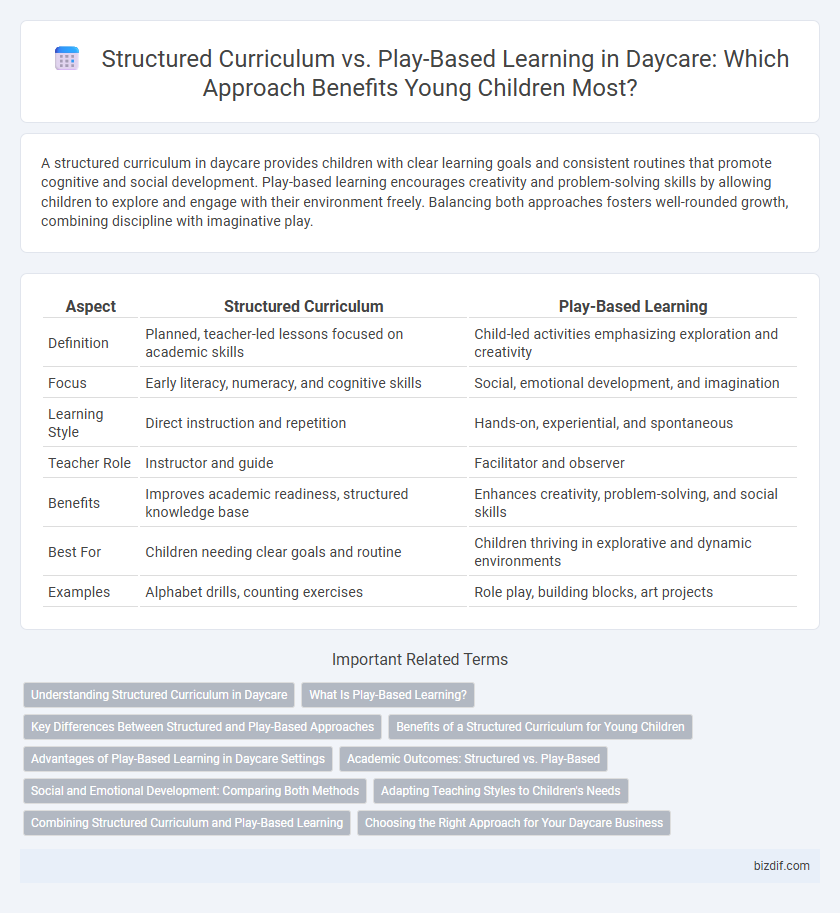A structured curriculum in daycare provides children with clear learning goals and consistent routines that promote cognitive and social development. Play-based learning encourages creativity and problem-solving skills by allowing children to explore and engage with their environment freely. Balancing both approaches fosters well-rounded growth, combining discipline with imaginative play.
Table of Comparison
| Aspect | Structured Curriculum | Play-Based Learning |
|---|---|---|
| Definition | Planned, teacher-led lessons focused on academic skills | Child-led activities emphasizing exploration and creativity |
| Focus | Early literacy, numeracy, and cognitive skills | Social, emotional development, and imagination |
| Learning Style | Direct instruction and repetition | Hands-on, experiential, and spontaneous |
| Teacher Role | Instructor and guide | Facilitator and observer |
| Benefits | Improves academic readiness, structured knowledge base | Enhances creativity, problem-solving, and social skills |
| Best For | Children needing clear goals and routine | Children thriving in explorative and dynamic environments |
| Examples | Alphabet drills, counting exercises | Role play, building blocks, art projects |
Understanding Structured Curriculum in Daycare
A structured curriculum in daycare offers a carefully planned framework that promotes consistent skill development in early childhood education, emphasizing literacy, numeracy, and social skills. This approach incorporates clear learning objectives and routine activities designed to foster cognitive growth and prepare children for formal schooling. By integrating age-appropriate lessons with measured assessment, a structured curriculum supports educators in tracking progress and ensuring comprehensive developmental milestones.
What Is Play-Based Learning?
Play-based learning is an educational approach in daycare settings that emphasizes child-led activities, encouraging exploration, creativity, and social interaction to promote cognitive and emotional development. Unlike structured curriculum, which follows predefined lessons and objectives, play-based learning allows children to learn through natural experiences, fostering critical thinking and problem-solving skills. Research shows that play-based methods support language acquisition, motor skills, and social competence by engaging children in meaningful, hands-on tasks.
Key Differences Between Structured and Play-Based Approaches
Structured curriculum in daycare emphasizes predefined goals, adult-led activities, and measurable skill development, promoting consistency and academic readiness. In contrast, play-based learning prioritizes child-initiated exploration, creativity, and social interaction, fostering cognitive and emotional growth through hands-on experiences. The key difference lies in the balance between directive instruction and child autonomy, impacting how children develop critical thinking and problem-solving skills.
Benefits of a Structured Curriculum for Young Children
A structured curriculum in daycare settings provides young children with consistent learning routines that enhance cognitive development and foster essential academic skills. It supports measurable progress in areas such as literacy, numeracy, and social-emotional growth by offering planned, age-appropriate activities tailored to developmental milestones. This approach prepares children for formal schooling by building a strong foundation in critical thinking, discipline, and time management.
Advantages of Play-Based Learning in Daycare Settings
Play-based learning in daycare settings enhances cognitive, social, and emotional development by encouraging children to explore, create, and problem-solve in natural, engaging environments. This approach fosters creativity, critical thinking, and communication skills while promoting autonomy and self-motivation. Research shows that children in play-based programs exhibit improved language development, social competence, and greater enthusiasm for learning compared to structured curriculum methods.
Academic Outcomes: Structured vs. Play-Based
Structured curriculum in daycare emphasizes measurable academic skills, such as literacy and numeracy, by following a planned schedule with specific learning goals. Play-based learning fosters cognitive and social development through child-led activities, enhancing creativity, problem-solving, and emotional regulation. Studies show that a balanced integration of both approaches tends to yield improved academic outcomes and holistic child development.
Social and Emotional Development: Comparing Both Methods
Structured curriculum in daycare emphasizes measurable social and emotional milestones through guided activities, promoting consistent skill development in self-regulation and empathy. Play-based learning fosters social and emotional growth by encouraging natural interaction, creativity, and emotional expression in a flexible environment. Both methods contribute to children's social competence, with structured curricula offering targeted support and play-based learning enhancing intrinsic motivation and peer collaboration.
Adapting Teaching Styles to Children's Needs
Adapting teaching styles to children's needs in daycare involves balancing a structured curriculum with play-based learning to foster optimal development. Structured curriculum provides clear learning objectives and measurable outcomes, while play-based learning enhances creativity, social skills, and cognitive growth through child-led exploration. Tailoring the approach ensures each child's unique developmental pace and learning preferences are supported effectively.
Combining Structured Curriculum and Play-Based Learning
Combining structured curriculum and play-based learning in daycare settings enhances cognitive, social, and emotional development by integrating intentional skill-building activities with child-led exploration. This balanced approach supports early literacy and numeracy while fostering creativity, problem-solving, and collaboration through interactive play. Research indicates that hybrid models optimize learning outcomes by providing diverse, engaging experiences tailored to developmental milestones.
Choosing the Right Approach for Your Daycare Business
Selecting the ideal approach for your daycare business involves evaluating structured curriculum versus play-based learning methods based on developmental goals and child engagement. Structured curriculum offers a clear framework with measurable outcomes in literacy, math, and social skills, while play-based learning promotes creativity, problem-solving, and emotional growth through hands-on activities. Balancing these pedagogical styles can optimize cognitive and social development, enhancing your daycare's educational value and appeal to parents.
Structured curriculum vs Play-based learning Infographic

 bizdif.com
bizdif.com